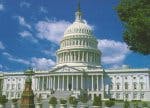Groups representing laboratory interests are engaged in a full court press to gather Congressional support for their legislative agenda. One major victory for labs would be an end to the freeze on Medicare Part B laboratory fees.
Lab groups are particularly pleased that President Bushs 2003 budget proposal does not call for a continuation of the freeze, which has been in place since 1998. This is good news, says Joanne Glisson, vice president of governmental affairs for the American Clinical Laboratory Association (ACLA) in Washington, DC.
The American Association of Bioanlaysts agrees. If Congress doesnt take steps to put the freeze back in place, there will be a Consumer Price Index increase in the Medicare Part B fee schedule on Oct. 1, 2002, the start of the new fiscal year, says Mark Birenbaum, Ph.D., administrator for AAB.
Laboratory associations that are part of the laboratory coalition are pushing for other legislative priorities as well. The coalition held a Capitol Hill day on March 19 to gather support for passage of a specimen collection fee bill (HR 3388). The legislation would raise the draw fee from the current $3 to $5.25 in fiscal 2002 and be adjusted annually thereafter for inflation. The coalition includes the AAB, ACLA, and the College of American Pathologists.
On another front, Glisson said the ACLA is pleased that, as part of his bioterrorism preparedness efforts, President Bush has proposed making laboratory personnel eligible for existing training programs under the Health Professions Program (Title VII of the Public Health Service Act).
In a related development, Health and Human Services Department (HHS) Secretary Tommy Thompson also told the House Ways and Means Committee that the Administrations budget would provide critical resources to state and local organizations to improve laboratory capacity, enhance epidemiological expertise in identification, surveillance, and containment of bioterrorism-related diseases, and improve electronic communication and distance learning.
Another item on the legislative agenda for laboratory groups includes the provisions of what once was known as the Medicare Patient Access to Preventive & Diagnostic Tests Act. The measure (HR 1798) would reduce administrative complexity and ambiguity of Medicare rules related to clinical lab benefits and modernize payments for laboratory services by establishing a national Medicare fee schedule for lab tests.
As it now stands, Congress took pieces of this bill and put them in different places, says
Birenbaum. Some of the administrative reform provisions of the bill have been incorporated in a Medicare regulatory and contractor reform measure that passed the House in December. The Senate version of the measure (S 1728) is pending before the Finance Committee. Neither measure has a provision from the original bill that would have raised fees for current tests on the Medicare lab fee schedule to 100 percent of the national median.
Groups representing laboratories have expressed hope that in the coming months they will win Congressional support for many of these legislative priorities. Watch this space for updates.
New requirements set for lab directors
The Centers for Medicare and Medicaid Services (CMS) and the Centers for Disease Control and Prevention (CDC) recently proposed a change in the requirements for directors of laboratories performing high complexity testing.
Currently, under the Clinical Laboratory Improvement Amendments (CLIA), individuals are allowed to direct these laboratories if they have a science doctoral degree but dont have board certification. These requirements are in place until Dec. 31.
Under the proposed change, directors of these labs could use training and experience instead of board certification to qualify for the position. The requirements were scheduled to change in 1994 to a doctoral degree and board certification by an HHS approved board. Instead, the government kept extending the deadline for the change.
As currently proposed by the CMS and the CDC, the director would have to meet one of several different requirements to qualify as a director. He or she would have to hold a doctoral degree and be certified by a board that received HHS approval; or hold an earned doctoral degree and have at least six years of laboratory training or experience or both, including two years directing or supervising high-complexity testing.
There also is a grandfather option, for those performing high-complexity testing before Jan. 1, 2003. In this case the individual would have to have a doctoral degree in chemical, physical, biological, or clinical laboratory science; have two years of lab training experience, or both; and have two years experience directing high-complexity testing.
Groups representing labs are not enthusiastic about the proposed change, says AABs
Birenbaum. AAB, for example, questions why the existing four-year training and experience requirement is being extended to six years. AAB would prefer to have the doctoral degree and board certification requirement, he adds.
Joan Szabo is a Washington, DC, freelance writer specializing in healthcare issues. She has been writing the Washington Report column for MLO for five years.
© 2002 Nelson Publishing, Inc. All rights reserved.


